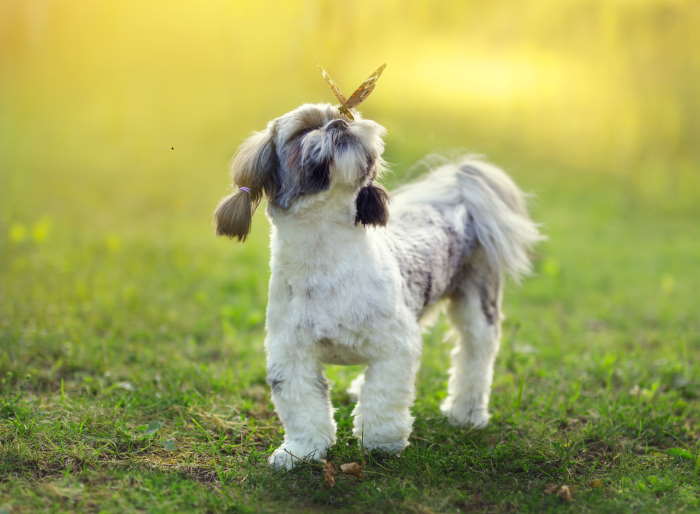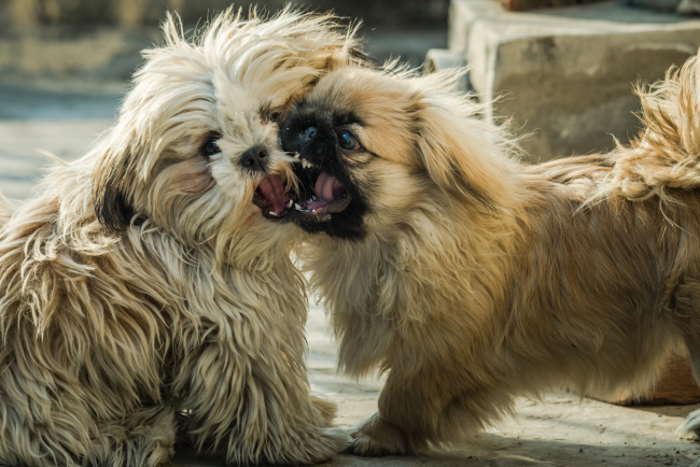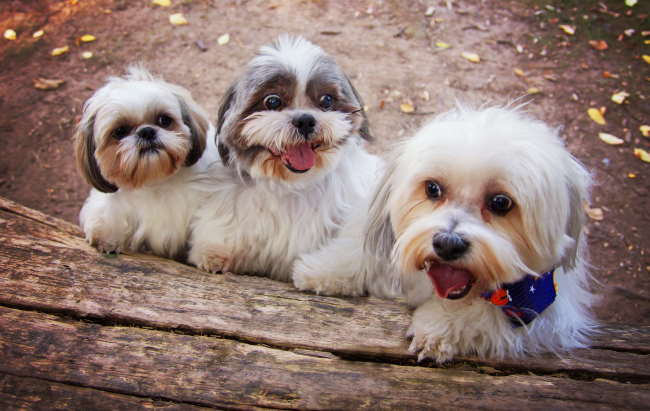Can A Shih Tzu Be Aggressive? Tips To Stop Bad Behavior Before It Gets Started
BY MOLLY | EVERYTHINGSHIHTZU.COM
This post may contain affiliate links. Read privacy & disclosure policy for info
If you’re already the proud owner of a Shih Tzu, you might think that there’s no way that sweet ball of fluff could ever be aggressive.
Of course, as dog breeds go, Shih Tzu are known for being friendly, affectionate animals that make good family pets; basically, they’re the opposite of aggressive.
 It's hard to imagine Shih Tzu being aggressive
It's hard to imagine Shih Tzu being aggressiveHowever, just like people, every dog has its own unique personality, history, and habits.
The Shih Tzu dog usually is not an aggressive breed, but some of these cute “lion dogs” can exhibit an aggressive streak. The severity of a Shih Tzu’s aggression varies from dog to dog, but no matter how mild or extreme a pup’s aggressive behavior is, it needs correcting as soon as possible.
The odds are good that if you bring a Shih Tzu into the fold, your new furry family member will be an excellent and loving addition to your pack.
Still, it is critical never to assume that signs of aggression are no big deal just because your dog is a Shih Tzu.
Aggressive behavior must be taken seriously no matter what kind of animal is displaying it.
But how aggressive can a Shih Tzu get?
How Aggressive Are Shih Tzu?
As a rule, the Shih Tzu is not known to be aggressive dogs, but there are always exceptions to every rule.
If your Shih Tzu is showing aggressive behavior, it can range from mild to severe. How serious your situation is will depend on how often your pup acts on her aggressive behavior.
For example, some dogs may only growl or try to stare you down as a display of aggression, while another animal may physically act upon their aggressive feelings, resulting in a dreaded dog attack.
No matter what category your pup falls into, any aggressive behavior must be taken seriously, because even the things that seem like no big deal have the potential to become very serious.
Sometimes, since the Shih Tzu is small in size, aggressive behavior may be ignored or dismissed as no big deal.
Ignoring this is a mistake, because if this negative behavior goes unchecked, your dog will assume it is okay and keep doing it, and it will likely get worse over time.
The bottom line is, how aggressive your Shih Tzu is doesn’t matter because any aggressive behavior needs to be taken seriously and handled right away.
Learn how to spot the beginning signs of aggression so you can "nip it" before it gets any worse.
What Are the Signs of Aggression in Dogs?
 Playing or aggressive behavior?
Playing or aggressive behavior?If a dog growls at you, your initial reaction is to probably back away, but did you know that dogs have different kinds of growls for different reasons?
It’s sort of how humans yell for different reasons; you can yell because you’re mad, but you can also yell because you’re cheering on your favorite team.
When it comes to recognizing aggression in dogs, it’s important to understand the difference between the actions that mean, “you better back off,” or “I’m nervous,” or even, “I want to play.
So, how do you know if a dog’s behavior might be dangerous? Here are some telltale signs that your pup might be aggressive:
- Rigid posture
- Pinned back ears
- Growling
- Baring teeth
- Snapping
- Biting (from light nips to more serious bites)
- Intense Stare
- Rapid tail movement with tail straight up
None of these body language signals is a definite clue that your dog is aggressive.
In fact, many of these signs can indicate other issues and feelings.
It's not uncommon that a dog showing its teeth might actually be engaging in submissive behavior, especially if an averted gaze or relaxed posture accompanies the teeth-baring.
Therefore, if you notice your Shih Tzu engaging in any of these behaviors, note her overall demeanor.
If you notice your pup doing more than one of these things at the same time, aggression is more likely the case.
What Should You Do If Your Shih Tzu Is Aggressive

Ideally, if you get your Shih Tzu when she is a puppy, there are practices that you can put in place from the start to prevent aggressive behavior from developing in the first place.
Socializing your puppy is critical, plus it is important to watch for any type of dominant behavior and discourage it from the get-go, using positive reinforcement when training your dog.
For example, if your pup tries to nudge you out of your spot on the sofa, or growls at you when you reach for a piece of dropped food, it is essential to nip these actions in the bud right away.
Never assume that small displays of aggression are no big deal; these are the types of behaviors that, if left unaddressed, develop into more severe aggression later.
Of course, you may have adopted or purchased an older pup already set in her ways. So, what do you do if your new dog already shows signs of aggression?
Many people assume that if their dog becomes aggressive, then the dog has to be given up or, even worse, put down, and that simply is not the case.
Depending on the level of aggression, many dogs can overcome their aggressive ways with proper training and behavioral therapy.
Still, even a redeemed pooch may make a better housemate for certain people over others.
Therefore, in these situations, the critical factor to consider is who else lives in the home with the dog.
For example, if your dog has a history of aggression, but has been re-trained, he still might not be a good fit for a home with young children or other dogs.
When it comes to the optimum place for your dog, your vet may be the best person to consult with for an honest, unbiased and realistic assessment of the ideal home for your canine pal.
Why Your Shih Tzu Becomes Aggressive: Learn the Source of Your Shih Tzu’s Aggressive Behavior
When you hear the term “aggressive dog,” you may immediately picture a dog that bites or worry that it is a dog that will attack.
However, aggression comes in many forms, and some dogs will only display mild aggressive behavior.
If your dog shows any signs of aggression, no matter how mild, work with your vet or a professional trainer specializing in dog behavior to uncover the root cause of your pup’s aggression.
Most often, tackling the cause of aggression is the best way to handle aggressive behavior.
Dogs can display aggressive behavior because they are:
- Frightened
- Establishing their dominance
- Nervous
- Protecting their territory (or even their owner)
- Sick
- In pain
- Confused
Suppose your usually calm and laid-back dog is suddenly acting aggressively. In that case, your first step should be a visit to your vet for a health exam to rule out any underlying medical conditions or hidden injuries that might cause your Shih Tzu’s uncharacteristic behavior.
Once you know the reason for your dog’s undesirable behavior, you can put together an effective and appropriate plan to handle it, resulting in a happier pooch and a more relaxed you.



